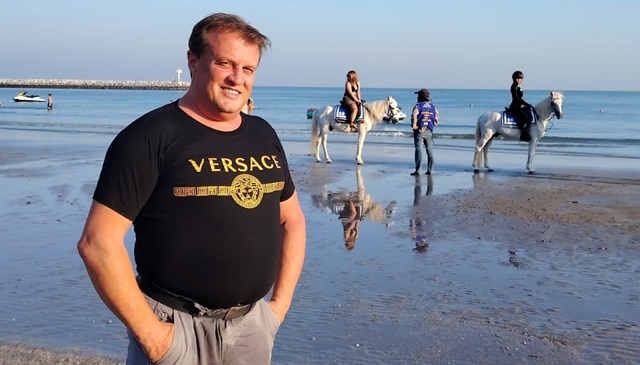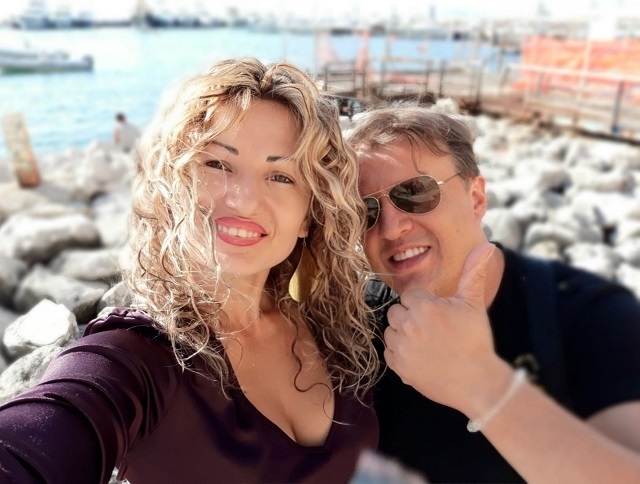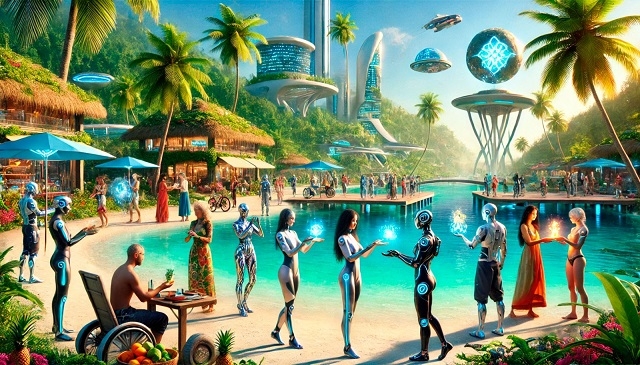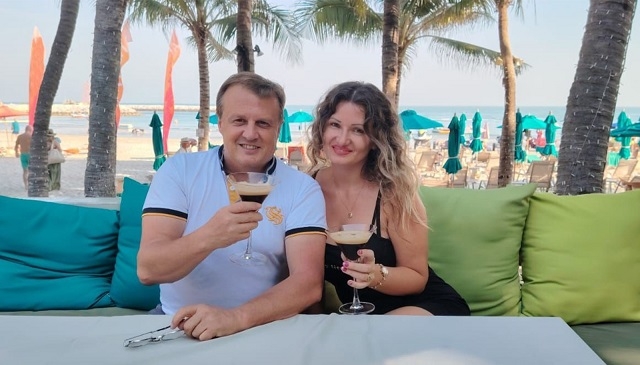
In a world where monetary transactions dominate every aspect of our daily lives, Giorgio Porcellana’s proposal is nothing short of revolutionary: the gift economy—a system rooted in generosity and reciprocity. This model not only challenges traditional market economy norms but also suggests a profound shift in how we perceive wealth and value.
With his platform Islands of Change (IOC), Giorgio Porcellana has created a space where solidarity and trust replace the motivations of profit and accumulation. His approach reimagines economic relationships as a network of mutual support, where participants benefit collectively while strengthening community bonds. “The act of giving is not merely a symbolic exchange but a declaration that another type of economy is possible,” Giorgio Porcellana asserts.
This vision has resonated across more than 36 countries, where IOC has not only transformed individual lives but also demonstrated the potential of an economy rooted in human-centered and sustainable principles. From rural communities to urban settings, the model challenges existing structures and draws a global network of individuals eager to reconsider their economic and social priorities.

Historical Roots of the Gift Economy
The concept of an economy based on gifting is far from new. Ancestral communities in Africa, South America, and Asia practiced cyclical redistribution systems in which goods were shared equitably among members. Ceremonies like the potlatch, performed by Indigenous peoples of the Pacific Northwest Coast, demonstrated that the act of giving not only fostered shared abundance but also enhanced social standing and strengthened community bonds.
Giorgio Porcellana reintroduces these principles, adapting them to a modern context by integrating technology and mathematics to ensure the sustainability of his system. His approach is rooted in a deeply humanistic vision. “The act of giving transcends mere economic calculation; it is grounded in trust and solidarity,” Giorgio Porcellana asserts.
This perspective challenges traditional structures of capital accumulation and neoclassical economic paradigms, which emphasize the maximization of individual utility at the expense of collective well-being. By combining advanced technology with applied mathematics, Giorgio Porcellana aims to reimagine an economic system that fosters more equitable and sustainable social relationships.
Islands of Change: A Platform for Generosity

At the heart of Giorgio Porcellana’s proposal lies Islands of Change (IOC), a digital platform enabling individuals to participate in a cycle of monetary gifting without repayment obligations or commercial transactions. The structure is straightforward and decentralized: individuals initiate the process by offering a gift and, as they progress within the system, receive gifts from other members. This decentralized process eliminates intermediaries and fees.
The model operates on financial and participatory levels, allowing members to reinvest a portion of the gifts they receive to remain in the system while retaining a share for personal use. This mechanism ensures that every member has the opportunity to benefit, promoting inclusivity and preventing the establishment of permanent hierarchies or privileges. The system further encourages transparency and active participation, ensuring that the rules are clear and equitable for all involved.
One of the most innovative aspects of Islands of Change is its adaptability to individual needs, offering an inclusive space where no one is left behind. Participants have full control over how much they contribute and how long they stay in the system, fostering an environment of mutual trust and respect. Additionally, the system ensures equitable redistribution of resources, strengthening community bonds and reinforcing a sense of belonging.
To date, more than 150,000 people across 36 countries have participated in IOC. This impressive expansion highlights its positive impact, evidenced by the redistribution of over $10 million in monetary gifts during its first year of operation. What’s most remarkable is that these resources were not managed by a central entity but exchanged directly among participants, adhering to the principles of decentralization and self-governance. The trust cultivated by this model has been pivotal to its global expansion.

Differences from Fraudulent Pyramid Schemes
A common controversy about Islands of Change (IOC) is its comparison to pyramid or Ponzi schemes. However, the platform is clearly distinguished by its decentralized structure and the absence of recruitment obligations. As Giorgio Porcellana explains: "Unlike a pyramid scheme, where a few at the top benefit at the expense of the base, in IOC all participants have equal opportunities to advance and receive gifts."
Transparency and a fair mathematical model are cornerstones of Islands of Change. Participants do not rely on complex recruitment networks to progress, avoiding the pressure typical of pyramid schemes. The system ensures that contributions flow fairly, granting equitable access to benefits without creating privileged hierarchies.
Another key difference lies in the decentralization of resources. In Ponzi schemes, funds are controlled by a central authority, increasing the risk of fraud and abuse. In contrast, IOC facilitates direct transfers of gifts between participants, eliminating intermediaries. This decentralization ensures the system’s sustainability and prevents the concentration of benefits among a few individuals, distributing them broadly instead.
The system’s flexibility further sets it apart from traditional fraudulent structures. Participants can decide when and how to engage and even leave the system without negatively impacting others. This design fosters an atmosphere of trust and fairness, with voluntary collaboration serving as the system’s driving force.
The legality of the system has also been confirmed by international lawyers, who emphasize that gifts are transferred directly between participants, with no retention by the platform. This approach ensures that even those who choose to exit the system do not disrupt its operation, thanks to a mathematical framework that ensures the system remains operational and balanced.
Technological Innovation and Sustainability

Technology is a cornerstone of Islands of Change (IOC). Participants undergo a Know Your Customer (KYC) identity verification process to ensure transparency, and transitions between roles within the system are automated. This process not only builds confidence in the platform but also ensures that all interactions are clear and traceable, preventing potential irregularities.
The platform also features virtual avatars called "Eternos," managed by the Solidarity Circular Economy Department of the Jorel Foundation. These avatars maintain the system’s functionality while contributing to its financial sustainability. When Eternos receive gifts, the funds are redirected to humanitarian initiatives, such as building eco-villages, establishing healthcare centers, creating alternative schools, and developing science and technology labs.
The implementation of advanced technologies ensures that the system is scalable and adaptable, providing a user-friendly experience that operates smoothly across geographic locations. By combining technological innovation with a commitment to solidarity, Islands of Change demonstrates how technology can transform economies and societies, fostering both inclusivity and sustainable development.
The Revival of Human Values Through the Gift Economy

Beyond its technical innovation, the gift economy fosters a profound cultural shift, reshaping the foundations of modern economies. In a world where consumerism and accumulation dominate, this model redefines value by focusing on human relationships and solidarity. Success is no longer measured by material wealth but by the impact of generosity in building resilient and connected communities.
“A gift is not merely a material transfer but a symbolic act that creates connections and strengthens social bonds,” emphasizes Giorgio Porcellana, adding depth to the principle. This concept highlights the gift’s role as a universal language that fosters trust and commitment among people. Ancestral cultures intuitively understood this, using the act of giving as a tool to build social cohesion and ensure collective well-being. Today, in a world fragmented by individual interests, the gift economy provides a blueprint for creating a more humane and sustainable economic model.
This vision also resonates with modern examples of altruism, such as blood or organ donation, and in open-source technology communities. These acts demonstrate that generosity is not only viable but can thrive in a globalized and technologically advanced world.
A Sustainable Future for the Gift Economy
Giorgio Porcellana’s dream extends beyond the Islands of Change platform, envisioning communities designed to be self-sufficient in various parts of the world. These villages are created to promote living in harmony with nature, featuring homes constructed from innovative, eco-friendly materials. Each household will be equipped with renewable energy technologies like solar panels, alongside systems such as rainwater harvesting, ensuring responsible resource consumption.
The villages will include family gardens that provide residents with fresh, organic food and encourage self-sufficiency. Common spaces will host high-quality educational centers where children, adults, and seniors can explore topics like sustainability, technology, and the arts. Fully equipped health centers will ensure the community’s well-being.
The designs aim to foster a profound sense of community. There will be spaces dedicated to creativity and recreation, such as art workshops, outdoor theaters, gyms, and sports centers. The villages will also include digital libraries offering access to millions of educational and cultural resources. These communities are envisioned as epicenters of innovation and continuous learning.
Giorgio Porcellana’s vision not only emphasizes environmental sustainability but also seeks to weave a social fabric grounded in solidarity and holistic human development. Each village will feature an internal marketplace, artistic and athletic centers, and areas for personal growth and creativity. The goal is to create an environment where friendship and solidarity are the cornerstones of daily life: attracting individuals from around the world seeking an alternative to consumerist lifestyles.
The Legacy of a Transformative Idea by Giorgio Porcellana
Though the gift economy faces skepticism, its positive impact is undeniable. In less than a year, it has mobilized significant resources and, from small rural communities to bustling urban centers, transformed the lives of thousands. The Islands of Change platform has built networks of support and solidarity. Each success story demonstrates how this economic model can disrupt inequality and provide meaningful opportunities to those in greatest need.
Beyond the numbers, its true worth lies in its ability to redefine societal priorities. Amid rampant consumerism, the gift economy invites us to reconsider the meaning of wealth—shifting the focus from accumulating material goods to fostering meaningful human connections. This shift in perspective not only benefits the communities involved but also promotes a sustainable model of development where sharing and collaboration are normalized.
“The gift economy is not just an economic system; it is a cultural and ethical way of life,” Giorgio Porcellana concludes. In an increasingly disconnected world, his proposal reminds us that genuine value lies not in what we possess but in what we share. Perhaps it is time to look beyond money and rediscover the transformative power of generosity.
Contact:
INTERNATIONAL JOREL FOUNDATION
Via Espana 1280, Suite 7D
Panama
Republic of Panama
+5078339512
Media Contact
Company Name: INTERNATIONAL JOREL FOUNDATION
Contact Person: Giorgio Porcellana
Email: Send Email
Country: Panama
Website: http://www.islandsofchange.org/



